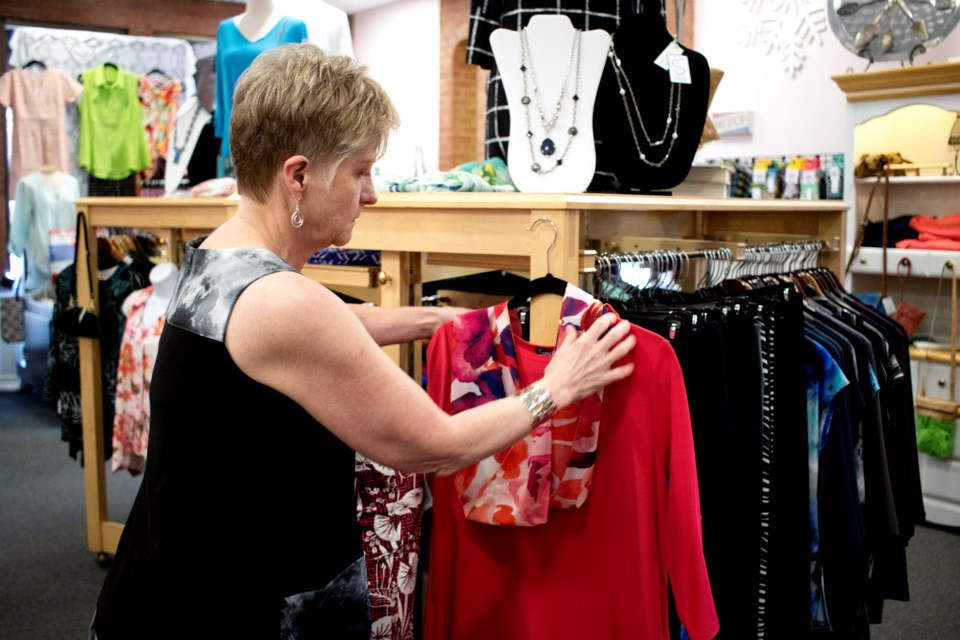Snow Apparel rejects the concept of retail therapy. At the downtown Longmont women’s clothing boutique, customers leave with garments made from sustainable practices, fair working conditions and small businesses and conversations about how fashion can make a difference.
Snow White, owner of the clothing shop, opened Snow Apparel at 520 Main St #B1 in 2017 after learning about the consequences of fast fashion. She recalls researching working conditions overseas of the garment industry several years before opening her store.
Snow Apparel joins a movement challenging the industry including a leading voice Fashion Revolution, a global advocacy network that was founded in the wake of the 2013 Rana Plaza disaster in Bangladesh where more than 1,100 garment workers died.
White, who has lived in Longmont for 25 years, was dissatisfied with the clothing store options around her. She didn’t want to buy her clothes from big-box stores, and often waited until her visits to her hometown Dallas, Texas to shop at her favorite boutiques. White and her husband started working on a business plan: a store that offered an alternative to fashion chains in Longmont.
“We just knew the fashion industry should be different. It could be different,” White said. “(Fashion corporations) were definitely putting dollars before people. And I just thought as a country as Americans, we should be able to lead that change. And that's when I started the business plan. What can I do, by myself, to get the industry to be better, better for the earth, better for its people, without spending so much money that it's unattainable for most people.”
Before Snow Apparel, White worked in banking, the wedding industry and sales and marketing. For her, all of that experience helped prepare her to be a business owner.
It took a few years to open the shop from its conception, but White said she took that time to carefully plan every detail of her store. She even knew that she wanted the location she’s in now.
White settled on three criterias for what she sells in her store: Every piece must be ethically sourced or fair trade, the majority uses sustainable materials or created through environmentally-conscious practices and most items are sourced from small businesses.
The majority of Snow Apparel’s inventory is made in the U.S. or Canada. For items that need to be imported overseas, White makes orders with other stores to reduce her carbon footprint.
There’s a constantly changing inventory at Snow Apparel, since most of the items are purchased directly from designers and cut to order. White prides herself on only buying a small amount of each item and rarely needing a sale to change her inventory over. There’s something for every budget, White said. Most of the styles are described as classic, comfortable and easy-care, and White sees regular shoppers from the age of 30 to 80.
White didn’t always buy clothes the way she does now. She got her start in retail by helping her friend with a bamboo-textile store in Boulder. During that time, she started learning about how different materials can be used for fabric and about sustainability in the industry.
“I just love the different fibers that are out there and what people use,” White said.
When customers visit Snow Apparel, White loves sharing where each hand-picked item is made and about different fabrics. There are handbags, made by an artisan near Romania, which are made from amadou mushrooms that mimics suede. White sells tops made from modal fabric — a material made from beech trees and looks like cotton. She offers faux-leather bags from Portugal made from cork oak.
White hopes that her customers leave with more knowledge on how they can impact the environment and work practices with their spending. Even if they don’t get it at the time, White said she’s glad to at least introduce them to the fashion revolution.
“I hope they take away that you don't have to buy into fast fashion. You can reduce your carbon footprint by what you purchase,” White said. “I just want them to slow it down. We like to say there's no retail therapy here. This is shopping with a conscience. You're here exploring and trying on and feeling and learning about fabrics and clothes, that's going to make the world better.”



